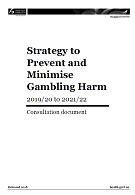Submissions on this consultation have now closed.

The Gambling Act 2003 sets out requirements for an ‘integrated problem gambling strategy focused on public health’.
The Ministry of Health is responsible for developing and refreshing the strategy at three-yearly intervals, and for implementing it. The Crown recovers the cost of developing and implementing the strategy, by way of a ‘problem gambling levy’ set by regulation at a different rate for each of the main gambling sectors. The Act specifies consultation requirements for the development of the strategy and the levy rates.
Consistent with these requirements, the Ministry is now seeking your comments on its draft Strategy to Prevent and Minimise Gambling Harm for 2019/20 to 2021/22 and on the draft levy rates.
The consultation document also refers to the needs assessment required by the Act, which looks at facts and figures relating to gambling harm in New Zealand, and has informed development of the consultation document.
Extension of consultation
Consultation on the Strategy to Prevent and Minimise Gambling Harm 2019/20 to 2021/22 has been open since 20 August 2018.
In addition to making consultation information publically available, the Ministry completed 10 public meetings. There has been a high level of interest from the public and from other interested parties at each meeting, and the Ministry of Health is grateful for the constructive approach taken to this consultation.
Due to that high level of interest, the Ministry recently published additional information on its website to assist submitters and respond to questions raised during and after the meetings.
In particular, the Ministry received questions regarding the proposal to carry over $5 million of underspent appropriation into the next Levy period for the purpose of:
- piloting new ways of working for public health and clinical intervention services in geographical areas or communities that are currently under-serviced ($3 million over 3 years)
- piloting peer support services ($800,000 over 3 years)
- piloting a small amount of residential care for gambling harm ($700,000 over 3 years)
- evaluation of the pilots ($500,000 over 3 years).
The indicative cost for these services is $5 million explained in the Consultation Document and Consultation slides. An indicative breakdown of the costs for these services is provided in the slide pack (slides 34 and 35) available below.
- Consultation meetings slide presentation (Powerpoint, 2.2 MB)
- Consultation meetings slide presentation (PDF, 1.3 MB)
This means that in practice the total funding required to fulfil the proposed Strategy is $60.339 million over three years. However the Ministry is proposing to fund this through:
- the Problem Gambling Levy recouping the cost of $55.339 million
- the Ministry carrying over $5 million of unspent appropriation.
The Ministry welcomes submissions on the Strategy, including on whether the $5 million underspend should be carried over into the following Levy period, and whether these proposed pilot services provide the best use of this funding, or whether the costs should be different.
Because of the level of interest in this, and in the interests of being fair and transparent, the Ministry has decided to extend its consultation period by a week. The period will now close at 5 pm, 28 September 2018 to allow time for the additional information to be considered as part of submissions.
If you have already made a submission, please feel free to make another or to resubmit a revised version, if you wish.
